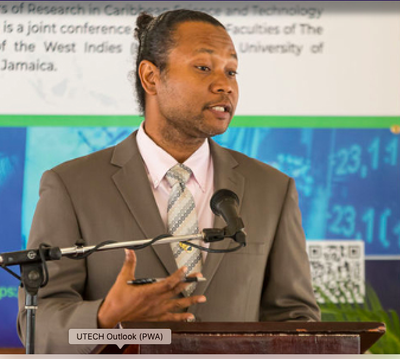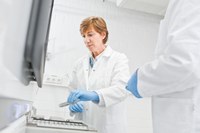Faculty of Science and Sport, Natural Products Research Lab (NPRL), Completes its First Whole Genome Sequencing & Publication

Dr. Andrew Lamm, Vice-Dean, Faculty of Science and Sport, UTech, Jamaica and Lead Scientist
Vice-Dean of the Faculty of Science and Sport (FOSS), UTech, Jamaica, Dr. Andrew Lamm, Lead Scientist and his international team have completed its first whole genome sequencing publication on the biocatalytically and medically important bacterium, Nocardia iowensis DSM 45197T. The paper is titled “Complete Genome Sequence of Nocardia iowensis DSM 45197T (= NRRL 5646T)” and is published in the American Society of Microbiology (ASM) journal, Microbial Resource Announcement. The article can be viewed ahead of print at https://journals.asm.org/doi/10.1128/mra.00581-22.
The project was conducted through the Natural Products Research Laboratory (NPRL) in the Faculty of Science and Sport (FOSS) with collaborators: Dr. Aneisha Collins Fairclough (Legacy for Airway Health, VCHRI|UBC, Canada); along with Drs. Boyke Bunk, Cathrin Spröer and Jolantha Swiderski from the Leibniz Institute, Germany.
The project saw the whole genome sequencing of N. iowensis by the team in an effort to better explore the biotechnological and medical potential of this microorganism which was officially named by Dr. Lamm in a previous publication (Lamm AS, et al. Nocardia iowensis sp. nov., an organism rich in biocatalytically important enzymes and nitric oxide synthase. Int J Syst Evol Microbiol 2009, 59:2408–2414. https://doi.org/10.1099/ijs.0.007427-0).
This bacterium is known for its production of several antibiotics, one antiviral agent, several novel biocatalytic enzymes, the first bacterial nitric oxide synthase system, among other interesting characteristics. The newly reported genetic data will be critical in exploring how these properties function in the environment and can be exploited for commercial and biotechnological purposes. Dr. Lamm notes that, surprisingly, this microbe is also very closely related to other Nocardia species which are known to infect animals, including human where it causes the disease nocardosis, which may appear as legions, abscesses and subcutaneous nodules. Therefore, the DNA sequencing data will be used to explore the relationship between this non-pathogenic strains more dangerous ones.
Dr. Lamm and his team will continue to explore this and other organisms in future research projects.



L-R: Dr. Aneisha Collins Fairclough (Legacy for Airway Health, VCHRI|UBC, Canada); Dr. Boyke Bunk, and Dr. Cathrin Spröer from the Leibniz Institute, Germany.
End.
Contact:
Michelle Beckford
Corporate Communications Manager
University of Technology, Jamaica
Telephone: 876 970-5299
Email: mbeckford@utech.edu.jm
